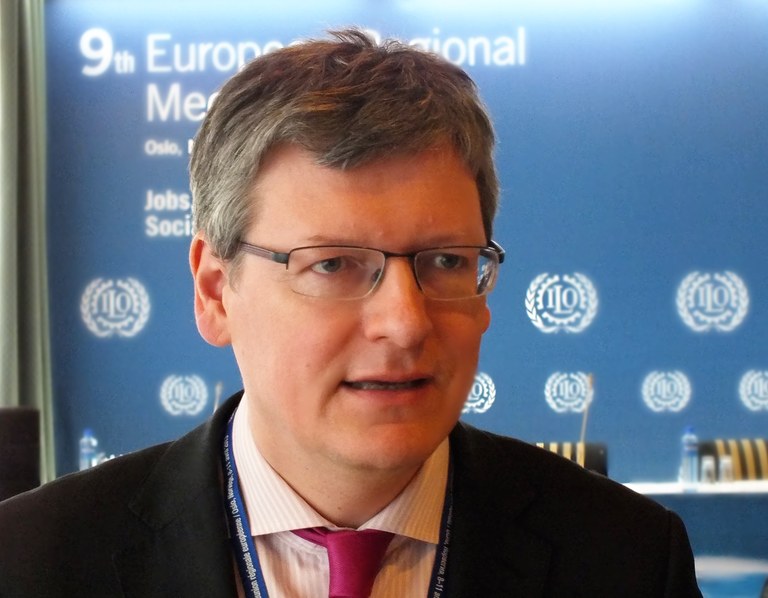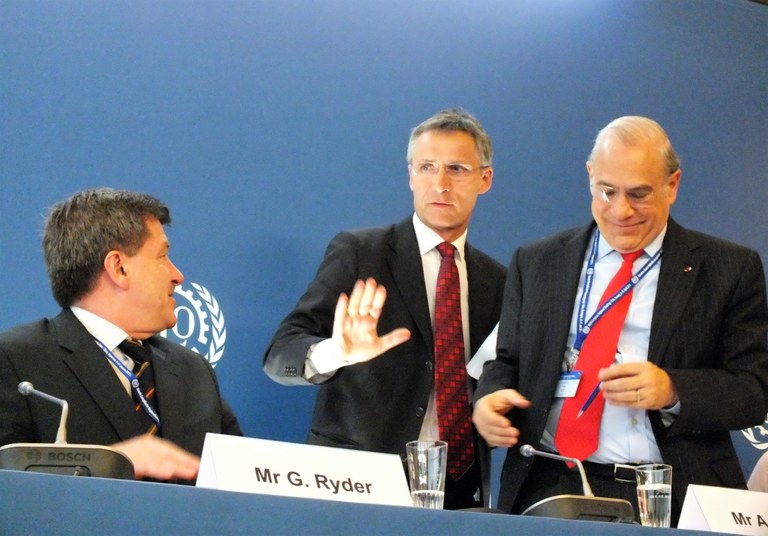ILO: Europe’s youth must get jobs and regain their confidence
The ILO will help put the youth guarantee into practice and make sure €6bn granted by the EU will be used to get Europe’s youth into work. The ILO will play a stronger role in helping crisis-hit European countries to improve the economic, social and political consequences of the crisis and to reestablish trust in the countries.
Youth unemployment was the key issue during the informal meeting of labour ministers at the ILO’s 9th European regional meeting in Oslo from 8 to 11 April. The consequences of Europe’s crisis was highlighted under the title ‘Jobs, growth and social justice’. The Oslo meeting concluded that the ILO should be given a stronger role in helping countries overcome the crisis, in accordance with the ILO’s own expectations.
More than ten million Europeans have lost their jobs since the crisis struck in 2008. The number of unemployed Europeans is now 26 million. Worst hit are young people and people with low education. On average nearly one in four youths in the EU are unemployed. In some places youth unemployment is nearly 60 percent. This means it is more common not to have a job than to have one.
“I hope this conference will give a strong message of determination and a recognition of the extreme gravity of the crisis - it is an extremely grave crisis. We have to be up to the challenge, not just the ILO but our constituency; governments, employers and employees,” the ILO’s Director General Guy Ryder tells the Nordic Labour Journal on the conference’s penultimate day.
Youth unemployment in Europe was a central area of debate during the informal meeting of labour ministers. EU countries came to a political agreement earlier this year to introduce a youth guarantee. Measures designed to fight youth unemployment has also been discussed by the EU Commissioner for Employment, Social Affairs and Inclusion, Lázló Andor, and the ILO’s Guy Ryder, who thinks this is an example of an area where the ILO can contribute more:
”The challenge today is to implement [the youth guarantee] at a national level to turn the money and the intention to get young people into work into concrete practical efficient schemes. That was something that was discussed in the informal meeting on Monday evening.
“The ILO can help link expertise on a European level to national experiences. Together with the EU and the member countries, Europe’s governments, employers and employees, the ILO can contribute with concrete and efficient solutions on a national plan,” says Guy Ryder.
No-one in denial about the crisis
More than half way through the conference he says the Oslo meeting’s debates have drawn in many participants, the room has been full. The meeting has been of an informal character, participants have spoken very honestly, very straight and with great engagement. 34 ministers of labour or vice-ministers along with trade union and employers’ representatives have been participating.
“It is also worth noting that not one of those addressing the conference has been in denial about the crisis,” says the ILO’s Director General, Guy Ryder.
In the six months since he took on the ILO leadership he has underlined that the crisis demands ILO to take on a new and active role in labour market politics. He now wants members, both governments and employers’ and workers’ organisations, to clearly say in which way they want the ILO to contribute in the face of the crisis. Without wanting to pre-empt the conference’s conclusions, he presents a few ideas:
“I think the ILO needs to be much more involved at a national level in addressing labour market challenges, I think we have a role to play,” he says, and gives an example:
“When the troika went to Greece and helped with all of the labour market reforms there, I think that if the ILO had been involved a better job would have been done. And that is logical, because we are the organisation that knows about labour markets. The troika doesn’t have the same expertise.”

The EU Commissioner for Employment, Social Affairs and Inclusion, Lázló Andor, tells the Nordic Labour Journal he does not quite agree that the ILO is not being involved. Guy Ryder also confirms that the ILO will take part in a seminar on the social dialogue in Greece along with the EU Commission.
“It’s to try to have governments, employers and workers to sit together and talk about the challenges ahead. We’ve been to Ireland, we are going to Portugal, we are going to Spain and we are going to Greece.”
The ILO’s new role
Tri-partite cooperation and social dialogue is core to what the ILO is doing. Social dialogue should help the partners find solutions together. Here the ILO’s Director General thinks his organisation can intervene and get involved on a national level.
“One of the victims of our crisis in Europe has been social dialogue, but talking together is always better than forcing solutions on people,” says Guy Ryder and holds up Greece as a good example.
“In Greece the social dialogue system is broken, quite simply, so when we go to Greece in June with the European Commission our job is to start to put the process of social dialogue back together. I could say the same in Spain. Spain has very strong traditions of social dialogue, but they don’t operate very well today, not at all. I could say the same about Portugal. In Ireland, there is social dialogue. It is a changed system of social dialogue, it is simply reorganised because of the crisis, but it is still there.”
Guy Ryder’s ambitions for the ILO’s new role is to get closer to members on a national level, but also to deepen partnerships on a regional level. The ILO wants to help set the political agenda on labour issues, and to talk to institutions which have a lot of influence on what is happening in Europe, like the IMF. The conference speakers have not been invited by coincident. They are the EU Commissioner for Employment, Social Affairs and Inclusion, Lázló Andor, the European Commission Vice President, Olli Rehn, Deputy Managing Director of the IMF, Min Zhu, Secretary General of the OECD, Angel Gurria, Secretary General of the European Trade Union Confederation (ETUC), Bernadette Segol and of course senior members of Europe’s employers’ organisations and heads of government like Norway’s Prime Minister Jens Stoltenberg, who represents the host.
“So we need to work at two levels: the regional with international organisations, but also with direct nation intervention, with social dialogue as a method.”
Social dialogue promotes trust
Countries with a successful social dialogue have clearly been the ones that have been able to best withstand the crisis in Europe: look at Austria, the Nordic countries, not least Sweden has done well when it comes to minimising the effects of the crisis. Now more countries are negotiating new labour market reforms based on social dialogue. France yesterday, the Netherlands is going through it right now.
So a lot is happening, he maintains. An impending strike in Norway the following week also became an talking point among those who arrived on the Sunday evening:
“But they talked to each other. Sure enough the next day it was done. It was a solution. I thought it was an important reflexion of the way this Nordic model works. People look for solutions together. Institutions exist, the trust exist, and it seems to work very well.”

Guy Ryder, ILO, Prime Minister Jens Stoltenberg and Angel Gurria, OECD
Prime Minister Jens Stoltenberg underlined in his speech on the Monday, as did the leader of the Norwegian Confederation of Trade Unions, Roar Flåthen, that despite what many believe Norway does have a flexible labour market, albeit within a well developed welfare system. This balance between flexibility and safety, or the lack of balance, has coloured this conference, says Guy Ryder.
Flexibility and safety
“Sometimes it is this dichotomy, it’s either austerity or it is jobs and growth, it’s either flexibility or it is security. I think we are struggling for ways at a European level to reconcile and combine these different objectives. It is legitimate to want public finances in balance, and it is legitimate to want people in jobs and to get economic growth back. We have to find ways that bring us to objectives together, and I think the Nordic Model gives important signposts, because you have combined flexibility in the labour market with security and good working conditions - so these don’t have to be opposites.”
This is also a question of trust?
“Yes, like Mr. Gurria, Secretary General from the OECD, said: trust is a very important commodity. And I think he is right. I think the crisis has reduced levels of trust in our society and that has to be rebuilt.”
According to the OECD investments in active labour market measures have fallen by 21 percent during the crisis. What do you make of that?
“It’s worrying. We understand that savings have to be made. But we have to be smart about the way we invest money and a good way to invest public money is in the type of active labour market policies which can put people back to work. It is not a cost, it’s an investment.”
After two and a half days of conference, are you any closer to a solution to the crisis in Europe?
“I don’t think the European crisis will be solved in Oslo in three days, but I think this meeting has moved us forward, although we have an awful lot more work to do. There are controversies. What is the right balance between structural reform on the labour market? You hear the employers say we need to do much more, you hear workers [say] some of the reforms that have been introduced have undermined workers’ fundamental rights. As Norway’s Minister of Finance Sigbjørn Johnsen said: This is not God’s work. Human decisions were behind the crisis, and they can be changed. The ILO wants to contribute to that change.”
- The Oslo declaration
-
Representatives for authorities, employers and workers from 42 European countries and Central Asia were present during the ILO’s 9th regional meeting. The conference theme was labour, growth and social justice.
- Youth guarantee
-
The ILO wants to work with the EU to get more young people into work.
- Facts about the ILO
-
The International Labour Organisation (ILO) is a third-party organisation for labour market issues, where workers, employers and authorities meet. The ILO was founded in 1919 and became a part of the UN in 1946. The organisation counts 185 member countries. Its aim is to “promote social justice and internationally recognised human and labour market rights.”
The ILO headquarters are in Geneva. In October 2012 British Guy Ryder became the organisation’s new Director General. His background includes international trade union work.
 Follow us on Facebook
Follow us on Facebook
